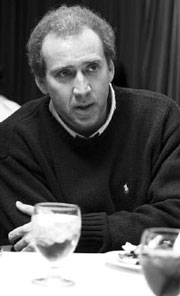A CLEVER, claustrophobic film by a Hollywood writer named Charlie Kaufman, Adaptation is about a blocked Hollywood writer named Charlie Kaufman, so you immediately know where we are: inside the media/meta fun house. Opening Dec. 20 (see p. 108 for theaters), Adaptation is a gimmick flick, full of devices, and a funny one, although not quite so funny or original as Kaufman’s Being John Malkovich. In the typically self-reflexive opening scene, Charlie visits the Malkovich set, where Malkovich, director Spike Jonze, and other real-life actors are at work. Look—there’s Catherine Keener! And John Cusack! Charlie might feel like he’s finally made it in showbiz; instead, he’s promptly booted from the soundstage like a schmuck. He gets no respect—not even from himself.
“Do I have an original idea in my head?” Charlie (Nicolas Cage) mutters in stoop-shouldered voice-over. He has reason to worry: He’s landed the plum assignment of adapting Susan Orlean’s book The Orchid Thief. However, creating a screenplay from “that sprawling New Yorker shit,” as he calls it, proves to be an impossible job. Pounding on his electric typewriter, barking unworkable scenarios into a Dictaphone, Charlie desperately tries to come up with an original take on the book without “being artificially plot-driven,” i.e., no car chases, shoot-outs, or romance.
How can he possibly top Malkovich? Should he start his script by explaining the theory of evolution? Jonze cuts to doddering old Charles Darwin—hopelessly uncinematic. Or maybe Charlie should emphasize famous botanists who perished in the jungles seeking rare orchids? Jonze shows us that, too, and the joke is that it’s totally unworkable as a movie—as panicky Charlie himself realizes.
The story of two struggling writers, Adaptation alternates between Charlie and Orlean (Meryl Streep), whom we see in flashback meeting and interviewing the Florida orchid thief, John Laroche (Chris Cooper). (Pretty soon the very notion of a flashback becomes meaningless, as Adaptation hopscotches among different stages of all its characters’ lives.) Orlean gets a book contract after her magazine article, but she has no idea what the book should be about. The more she interviews the redneck genius horticulturist, the more the book becomes about her interviewing him—so she finally writes herself into Laroche’s story. Charlie will later write himself into hers. The metas pile up.
LAROCHE’S PASSION shames the bookish Manhattan sophisticate Orlean. No wonder—Cooper’s Laroche nearly steals the movie with his outsize integrity and self-assurance; he’s as authentic as the dirt beneath his fingernails. Taking notes on her subject’s rambling tirades, Orlean writes, “Delusions of grandeur,” then ends up admiring those same qualities—just as Charlie admires Orlean’s seeming integrity and high literary reputation, which make him feel like an underachieving hack by comparison. The film’s symbol is the flower that so beautifully adapts to minute evolutionary advantage. So, Charlie wonders, why can’t people be more like the mutable orchid? Why are we so . . . stuck with who we are?
Envy turns to love in a daisy chain of discontented relationships. Enter Charlie’s twin brother Donald (also played by Cage), a cheerfully untroubled lout who’s completely at ease in his own skin (like Laroche). Crashing at Charlie’s house in the hopes of becoming a screenwriter, Donald innocently accepts his brother’s sarcastic advice—then turns it into a schlocky script worth six figures!
The two finally end up collaborating on Charlie’s Orchid script, as Adaptation launches into a third act that’s like an episode of Starsky and Hutch, embracing the very Hollywood conventions that Charlie despises—but, of course, with a wink. (And remember to sit through the credits for a final kicker.) Wearing the most unflattering (if truthful) wig in his acting career, Cage makes Charlie an endearing, insecure nebbish. “I’m a walking clich鬢 he says. But the shtick is still shtick—even when you point to it. Streep’s part is more cerebral (until the over-the-top finale), and her half of the movie gets overwhelmed by the inside-showbiz stuff.
Adaptation is constantly amusing, but too constantly pleased with its own ingenuity. I laughed all the way through at the narrative trickery, but when Kaufman and Jonze ask for genuine emotion in the sentimental ending, it doesn’t feel earned because of all the irony and artifice that came before. (Punch-Drunk Love and Far From Heaven share this same smart filmmakers’ syndrome.) Adaptation is more meta than meant, but you can’t have it both ways—which finally makes the film a brilliant half-success.









